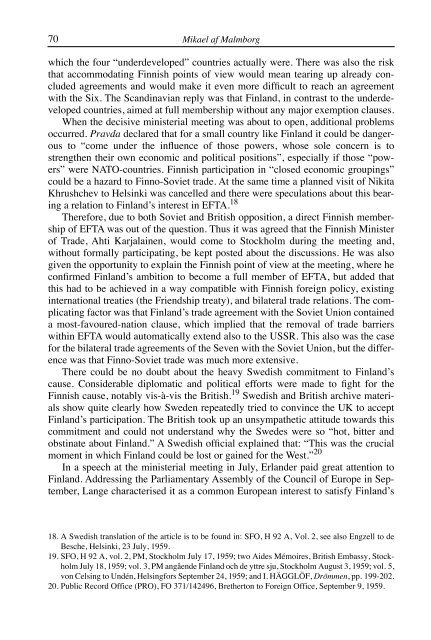Journal of European Integration History – Revue d'histoire de l'
Journal of European Integration History – Revue d'histoire de l'
Journal of European Integration History – Revue d'histoire de l'
- No tags were found...
Create successful ePaper yourself
Turn your PDF publications into a flip-book with our unique Google optimized e-Paper software.
70Mikael af Malmborgwhich the four “un<strong>de</strong>r<strong>de</strong>veloped” countries actually were. There was also the riskthat accommodating Finnish points <strong>of</strong> view would mean tearing up already conclu<strong>de</strong>dagreements and would make it even more difficult to reach an agreementwith the Six. The Scandinavian reply was that Finland, in contrast to the un<strong>de</strong>r<strong>de</strong>velopedcountries, aimed at full membership without any major exemption clauses.When the <strong>de</strong>cisive ministerial meeting was about to open, additional problemsoccurred. Pravda <strong>de</strong>clared that for a small country like Finland it could be dangerousto “come un<strong>de</strong>r the influence <strong>of</strong> those powers, whose sole concern is tostrengthen their own economic and political positions”, especially if those “powers”were NATO-countries. Finnish participation in “closed economic groupings”could be a hazard to Finno-Soviet tra<strong>de</strong>. At the same time a planned visit <strong>of</strong> NikitaKhrushchev to Helsinki was cancelled and there were speculations about this bearinga relation to Finland’s interest in EFTA. 18Therefore, due to both Soviet and British opposition, a direct Finnish membership<strong>of</strong> EFTA was out <strong>of</strong> the question. Thus it was agreed that the Finnish Minister<strong>of</strong> Tra<strong>de</strong>, Ahti Karjalainen, would come to Stockholm during the meeting and,without formally participating, be kept posted about the discussions. He was alsogiven the opportunity to explain the Finnish point <strong>of</strong> view at the meeting, where heconfirmed Finland’s ambition to become a full member <strong>of</strong> EFTA, but ad<strong>de</strong>d thatthis had to be achieved in a way compatible with Finnish foreign policy, existinginternational treaties (the Friendship treaty), and bilateral tra<strong>de</strong> relations. The complicatingfactor was that Finland’s tra<strong>de</strong> agreement with the Soviet Union containeda most-favoured-nation clause, which implied that the removal <strong>of</strong> tra<strong>de</strong> barrierswithin EFTA would automatically extend also to the USSR. This also was the casefor the bilateral tra<strong>de</strong> agreements <strong>of</strong> the Seven with the Soviet Union, but the differencewas that Finno-Soviet tra<strong>de</strong> was much more extensive.There could be no doubt about the heavy Swedish commitment to Finland’scause. Consi<strong>de</strong>rable diplomatic and political efforts were ma<strong>de</strong> to fight for theFinnish cause, notably vis-à-vis the British. 19 Swedish and British archive materialsshow quite clearly how Swe<strong>de</strong>n repeatedly tried to convince the UK to acceptFinland’s participation. The British took up an unsympathetic attitu<strong>de</strong> towards thiscommitment and could not un<strong>de</strong>rstand why the Swe<strong>de</strong>s were so “hot, bitter andobstinate about Finland.” A Swedish <strong>of</strong>ficial explained that: “This was the crucialmoment in which Finland could be lost or gained for the West.” 20In a speech at the ministerial meeting in July, Erlan<strong>de</strong>r paid great attention toFinland. Addressing the Parliamentary Assembly <strong>of</strong> the Council <strong>of</strong> Europe in September,Lange characterised it as a common <strong>European</strong> interest to satisfy Finland’s18. A Swedish translation <strong>of</strong> the article is to be found in: SFO, H 92 A, Vol. 2, see also Engzell to <strong>de</strong>Besche, Helsinki, 23 July, 1959.19. SFO, H 92 A, vol. 2, PM, Stockholm July 17, 1959; two Ai<strong>de</strong>s Mémoires, British Embassy, StockholmJuly 18, 1959; vol. 3, PM angåen<strong>de</strong> Finland och <strong>de</strong> yttre sju, Stockholm August 3, 1959; vol. 5,von Celsing to Undén, Helsingfors September 24, 1959; and I. HÄGGLÖF, Drömmen, pp. 199-202.20. Public Record Office (PRO), FO 371/142496, Bretherton to Foreign Office, September 9, 1959.
















